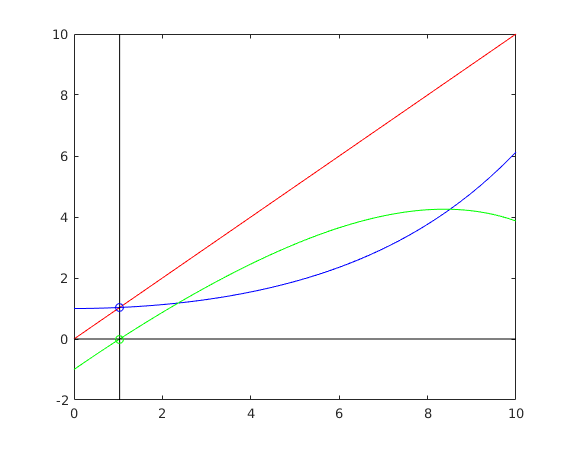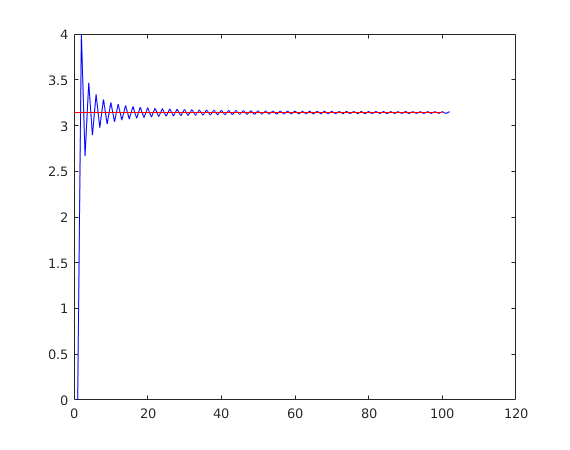Loops¶
Fibonacci Sequence¶
$F_1 = 1$, $F_2 = 1$ and $F_i = F_{i-1} + F_{i-2}$, $i = 3, 4, ...$
In [1]:
n=20;
F(1)=1;
F(2)=1;
for i=3:n
F(i)=F(i-1)+F(i-2);
end
F
In [2]:
clear all
F(1)=1;
F(2)=1;
n=3;
F(3) = F(1) + F(2);
while n<=10
F(n)=F(n-1)+F(n-2);
n=n+1;
end
F
A simple while loop
In [3]:
x=1
while x<=10
x=2*x
end
In [4]:
A=[1 2 3; 4 5 6; 7 8 9];
B=[5 6 7;8 9 0;3 4 5];
disp('sum of two matrices without loop')
A+B
for i=1:3
for j=1:3
C(i,j)=A(i,j)+B(i,j);
end
end
disp('sum of two matrices using for loop')
C
Matrix multiplication¶
In [5]:
A=[1 2 3; 4 5 6; 7 8 9];
B= [3 2 1; 6 5 4; 9 8 7];
C=zeros(3);
disp('Matrix multiplication without loop')
disp(A*B)
for i=1:3
for j=1:3
% C(i,j)=0;
for k=1:3
C(i,j)=C(i,j)+A(i,k)*B(k,j);
end
end
end
disp('Matrix multiplication using for loop')
disp(C)
Find factorial $n! = 1. 2. 3. ... (n-1)n$
In [6]:
n=5;
f=1;
i = 1;
for i=1:n
f=f*i;
i=i+1;
end
disp('using for loop')
disp(f)
f1=1;
i=1;
while i<=n
f1=f1*i;
i=i+1;
end
disp('using while loop')
disp(f1)
In [7]:
function f = fact(n)
f = prod(1:n);
endfunction
In [8]:
fact(5)
Fixed point iteration, $x = \phi(x)$, $x_n =\phi(x_{n-1})$. For example $x = cosh(x/4)$
In [12]:
clear all
disp('Fixed point iteration');
phi = @(x) cosh(x/4);
xf=1;
er = 1;
k=0;
while ((er > 1e-8) && (k < 100))
xnew = phi(xf);
er = abs(xnew-xf);
xf = xnew;
k = k+1;
end
xf
k
In [19]:
%plot gnuplot
f = @(x) x - phi(x);
x=0:0.05:10;
y1=x;
y2=phi(x);
plot(x,y1,'r',x,y2,'b')
hold on
plot(x,f(x),'g',x,0*x,'k',xf*ones(length(-2:0.05:10),1),-2:0.05:10,'k')
plot(xf,xf,'ob',xf,0,'og')
hold off

Leibniz formula for $\pi$,
$\frac{\pi}{4} = \sum_{n=0}^{\infty} \frac{(-1)^n}{2n+1}$
In [23]:
clear piapprox
n=100;
piq=0;
piapprox = 0;
for i=0:n
piq=piq+((-1)^i)/(2*i+1);
piapprox = [piapprox, piq*4];
end
piapprox(end)
%plot gnuplot
plot(piapprox,'b')
hold on
plot(0:n,pi*ones(length(0:n),1),'r')
hold off
